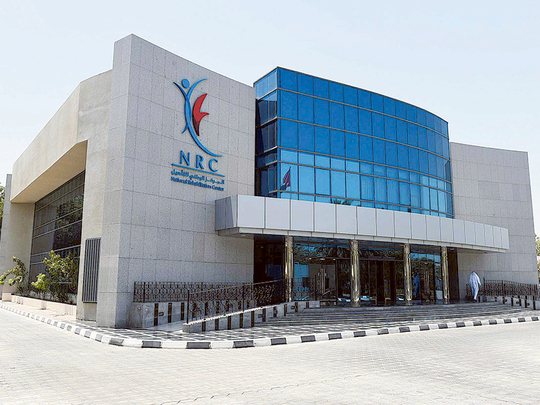
Abu Dhabi: The National Rehabilitation Centre (NRC) is the organisation responsible for giving drug addicts a new lease of life. Shaikh Zayed Bin Sultan Al Nahyan established the centre in 2002 after he came across several cases of young people, who were addicted to drugs.
The NRC started out in a temporary building before moving to its main headquarters. With 28 beds between 2002 to 2010, it has since grown into having a capacity of 78 beds.
Dr Ahmad Yousuf Mohammad, Director of the Psychiatry Section at NRC, spoke to Gulf News about the NRC’s history, its role in rehabilitating drug addicts, and its future plans.
“Shaikh Zayed played a very important role in arranging everything to establish this centre and to give it what it needs. He ordered Shaikh Mansour Bin Zayed Al Nahyan, Deputy Prime Minister and Minister of Presidential Affairs, to be the director at the beginning, and gave him the support to establish a centre with a good reputation not only in the UAE but the region,” he said.
Dr Mohammad explained that prior to its opening, the centre gathered expertise by consulting with other countries, who had a deeper grasp on tackling drug addiction.
“One of those countries was the United Kingdom. The British government helped us with research and advice, they sent doctors and physicians from London to Abu Dhabi to help us open the centre. They studied our needs and gave us advice in terms of how to properly run a physician and administration section,” he said.
Initial challenges
The NRC faced a number of challenges when it was launched, which was mainly caused by society’s reluctance to accept a rehabilitation centre that helped drug addicts.
“A large [number] of Emiratis did not believe that we had such a problem, [and] they did not understand the reality,” said Dr Mohammad.
“A second challenge was with the law – how did the law deal with these kind of cases pertaining to addiction, was the person a criminal or a victim? We signed agreements with the Ministry of Interior — we have the victim, and the criminal, the people who are selling are the criminals and the people using are the victims, we said that only the addicted ones are the victims,” he said.
However, a stigma is no longer attached to the NRC, with the centre already in the process of moving its headquarters from Khalifa City to a newer and larger building in Al Mafraq.
“Our new facilities will be like a compound which will have a clinic, a spa, and all facilities. The land for our new headquarters was also a gift from Shaikh Zayed, which he gave to us for free. The cost of our new building was Dh290 million, which the government helped fund,” he said.
The NRC also collaborates with a number of organisations inside and out of the UAE, including the Harvard University and Mclean Hospital, who provide advice and professional education to doctors.
Collaboration
The centre also works with the UN Office for Combating Drugs, and the British National Institute. Within the UAE, the NRC works with UAE University, in addition to Abu Dhabi and Khalifa Universities.
Dr Mohammad explained that when dealing with drug addicts, there are several steps that need to be followed to ensure patient rehabilitation.
“The first step is to convince the addicted person that he is a victim, and that he has a right to be treated,” he said.
During this stage, doctors have to explain to patients the different types of medication, and how they should be taken.
“The second step is to deal with the parents and the people around the addicted person. The most important thing is to convince the family members that these are patients, victims, and not criminals,” he said. At present, a new law is being prepared to deal with people who are addicted to narcotics, and the government is preparing the final draft — with the head of the NRC among the committee responsible for reviewing this new law.
Five-week process
The entire rehabilitation process takes five weeks, according to Dr Mohammad. “There is a poison inside this person’s body and we want to remove it. So for five weeks, there is a detoxification period to clean up the person’s body,” he said.
When addicts enter the centre, they first undergo a medical check-up and afterwards, the person’s state of mind is evaluated to see whether they are ready to discuss their case. “In the third step, we put together a rehabilitation and medical plan. Each plan vaies depending on the kind of diagnosis and medication the person needs.
“After the five weeks, we begin another four weeks of medication, monitor the person, and talk to him on addiction and how to stay clean,” he said.
Even though the centre’s capacity is limited, Dr Mohammad assured that it does intend to expand its services to non-Emiratis once they increase their capacity.
However, the centre does give some support in emergency cases for non-Emiratis, “but we do not accept them inside because of a limited bed capacity,” he added.








